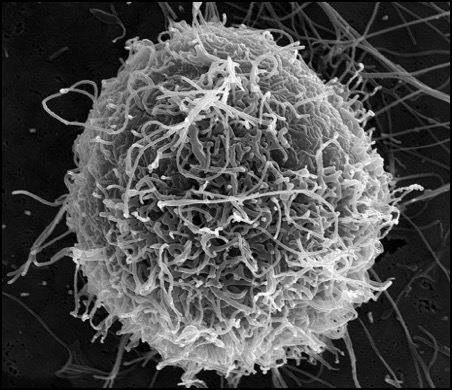Surviving Ebola
23/10/14 16:07 Filed in: Interests
What helps some people be able to resist and/or survive Ebola? Knowing some of the background of this type of immunity would be useful. More information found here.
Ebola virus particles on a cell’s surface.....

“People who survive Ebola can lead normal lives post-recovery, though occasionally they can suffer inflammatory conditions of the joints afterwards, according to CBS. Recovery times can vary, and so can the amount of time it takes for the virus to clear out of the system. The World Health Organization found that the virus can reside in semen for up to seven weeks after recovery. Survivors are generally assumed to be immune to the particular strain they are infected by, and are able to help tend to others infected with the same strain. What isn't clear is whether or not a person is immune to other strains of Ebola, or if their immunity will last.
As with most viral infections, patients who recover from Ebola end up with Ebola-fighting antibodies in their blood, making their blood a valuable (if controversial) treatment option for others who catch the infection. Kent Brantly, one of the most recognizable Ebola survivors, has donated more than a gallon of his blood to other patients. The plasma of his blood, which contains the antibodies, is separated out from the red blood cells, creating what’s known as a convalescent serum, which can then be given to a patient as a transfusion. The hope is that the antibodies in the serum will boost the patient’s immune response, attacking the virus, and allowing the body to recover.”
Ebola virus particles on a cell’s surface.....

“People who survive Ebola can lead normal lives post-recovery, though occasionally they can suffer inflammatory conditions of the joints afterwards, according to CBS. Recovery times can vary, and so can the amount of time it takes for the virus to clear out of the system. The World Health Organization found that the virus can reside in semen for up to seven weeks after recovery. Survivors are generally assumed to be immune to the particular strain they are infected by, and are able to help tend to others infected with the same strain. What isn't clear is whether or not a person is immune to other strains of Ebola, or if their immunity will last.
As with most viral infections, patients who recover from Ebola end up with Ebola-fighting antibodies in their blood, making their blood a valuable (if controversial) treatment option for others who catch the infection. Kent Brantly, one of the most recognizable Ebola survivors, has donated more than a gallon of his blood to other patients. The plasma of his blood, which contains the antibodies, is separated out from the red blood cells, creating what’s known as a convalescent serum, which can then be given to a patient as a transfusion. The hope is that the antibodies in the serum will boost the patient’s immune response, attacking the virus, and allowing the body to recover.”
blog comments powered by Disqus

